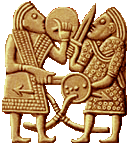![]()
An introduction to Odinism
What is Odinism?
Odinism is the continuation of the religious, spiritual and philosophical beliefs of the indigenous peoples of northern Europe and their descendants both in Europe and the "New World". Our ancestors had a very subtle understanding of the relationship between humanity, nature, and human and divine destiny. This highly moral and scientifically advanced viewpoint was suppressed when Christianity was imposed on the North Sea Peoples, but it never died out.
Today it is flourishing once again, and is recognised as a valid religion by the governments of Australia, the United Kingdom, the United States and Iceland. In the 21st century we have become heirs to the wisdom of our forebears, and we are gradually rediscovering just how wise they really were.
What does Odinism involve?

-
Odinism is the key to both the past and the future. It is one of the few living traditions that still honour the religious and philosophical traditions of ancient Indo-European spirituality.
-
Modern Hinduism, Jainism and Buddhism have perverted that tradition, but the eternal truths of Odinism have been preserved, both in texts and in practice.
-
Odinism provides an understanding of the next stage of our history, during which a higher form of humanity will come into being, and helps us deal with this difficult period of transition.
-
We recognise many gods and goddesses, some of whom are familiar from the names of the days of the week. Tuesday, for instance, is named after Tiw, Wednesday after Woden (In Scandinavia known as Odin and in Germany as Wotan), Thursday after Thor, and Friday after Frigga.
-
The gods and goddesses are our friends and allies.
-
Our ancestors are sacred. Some are already living with the gods.
-
Many of us will be reincarnated until we reach our potential.
-
The world is currently undergoing a period of dislocation and depravity, known in our sacred texts as the "Wolf Age". If we and the gods work together, the forces of chaos can be defeated, and humanity can be surpassed by a higher evolutionary entity.
The Nine Pillars of Odinism

-
To maintain candour and fidelity in love, and devotion to the tried friend: "Though he strike me I will do him no scathe".
-
Never to make wrongsome oath: grim is the reward for the breaking of plighted troth.
-
To deal not hardly with the humble and lowly.
-
To remember the respect that is due to great age.
-
To suffer no evil to go unremedied and to fight against the enemies of family, land, folk and faith: "My foes I will fight in the field, nor be burnt in my house".
-
To succour the friendless, but to put no faith in the plighted word of strangers.
-
To strive not against the word of fools and drunks: for many a grief grows from such things.
-
To give kind heed to the dead: straw-dead, sea-dead or sword-dead.
-
To abide by the enactments of lawful authority, and to bear with courage the decrees of the Norns.
The Nine Pillars of Tradition

The majority of Odinists around the world are of Anglo-Saxon origin. Our spirituality is therefore certainly not confined to texts that have survived from Scandinavian sources. Our religion doesn't lay claim to an historical founder. Nor is it defined by a single holy book. All sincere affirmations of our faith may be considered holy as long as they are sanctioned by the following sources of tradition:
-
Historical information that has been handed down from relatively early times - such as Tacitus' observations on the continental Angles, Bede's disclosures on the faith of his ancestors, and so on.
-
Archaeological evidence bearing on our ancestral beliefs and religious customs, such as the excavations at Yeavering and Sutton Hoo.
-
Aspects of our religion that have been transmitted in non-literary ways, such as folk-customs, music and art.
-
Incorporations of our beliefs into partially or even predominantly Christian texts and activities, such as Beowulf, Caedmon's Hymn, and the Yule and Easter festivals.
-
Primary religious texts in non-English languages that may have been written in Britain, such as Eiriksmal.
-
Surviving texts and traditions from the related pre-Christian faiths of Europe and Scandinavia, as well as the broader Indo-European tradition.
-
The living corpus of Odinist art, music and literature produced since the Christian conquest.
-
Rites and ceremonies practiced in a variety of twentieth century movements within the Odinist revival.
-
Personal experience of the ancestral gods and goddesses - or aspects of them - perhaps through morphic resonance with others who have previously followed the same religious path.
![]()